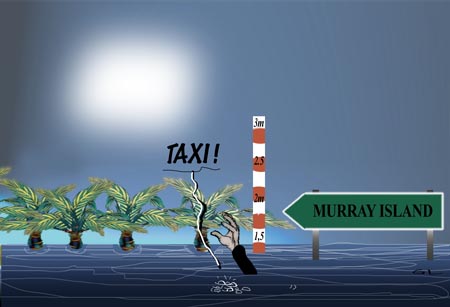Search
Recent comments
- journalism....
2 hours 8 min ago - day three.....
2 hours 52 min ago - lawful law?....
3 hours 12 min ago - insurance....
3 hours 19 min ago - terrorists....
3 hours 30 min ago - nukes?...
5 hours 37 min ago - rape....
6 hours 16 min ago - devastation.....
8 hours 28 min ago - bibi's dream....
10 hours 17 min ago - thus war....
14 hours 28 min ago
Democracy Links
Member's Off-site Blogs
waterlogged .....

Like Kiribati and Tuvalu, the islands of the Torres Strait are slowly being submerged. But unlike their Pacific neighbours, the plight of their inhabitants is being overlooked.
Ron and Maria Passi, who operate Murray Island's only taxi, were out driving the night the king tide struck. Neighbours flagged them down, asking for help, and so it was not until some time later that they saw their own grandchildren standing in the road. 'They were shouting 'Granddad, stop the car, the water is coming in the house',' says Ron. 'I just slammed on the brakes.'
The couple's son, Sonny, was outside his fibro shack with his five children, watching the monster surf, lashed by north-west winds, rise ever higher. In the commotion, everyone had forgotten that Sedoi, the baby, was still inside. They heard her crying and found her in her cot, covered in sand. Water had surged in after a wave picked up a big wooden pallet and flung it through the front wall.
No-one on Murray had ever seen such a high tide before. Other islands in the Torres Strait, which lies between the far north-eastern tip of the Australian mainland and Papua New Guinea, have witnessed similar scenes in recent years. Houses, roads and graveyards have been flooded, and the locals believe they know the reason: climate change.- By Gus Leonisky at 6 May 2008 - 11:12pm
- Gus Leonisky's blog
- Login or register to post comments
tacklessness behind the bushes
— Wesley HeddenThe Cyclone's Wake, Seen in Taxi Headlights
climate refugees
Climate change refugees to be resettled in PNG
The world's first climate change refugees will be relocated from their Pacific island home to Papua New Guinea by March next year.
The Solomon Islands Broadcasting Corporation says 40 families from north of Ontong Java in the Solomon Island's Malaita Province will be relocated to Bougainville.
Flooding has made parts of their islands completely uninhabitable and the islands are expected to be fully submerged by 2015.
The relocation is estimated to cost the Autonomous Bougainville and PNG Government millions of dollars over the next six years.
One third of the 1,500 residents have refused to leave the islands.
see toon at top...
gloob-gloooo-gloog...
The government of the Maldives is set to hold a cabinet meeting six metres underwater to highlight the threat of global warming.
President Mohamed Nasheed and his cabinet will sign a document, calling for global cuts in carbon emissions.
Ministers have been training for weeks for the dive, and will communicate with white boards and hand signals.
Officials from the low-lying island nation say the dive is "a bit of fun", intended to send a serious message.
The Maldives stand an average of 2.1 metres (seven feet) above sea level, and the government says they face being wiped out if oceans rise.
Military minders
Three of the 14 cabinet ministers will miss the underwater meeting because two were not given medical permission and another is abroad, officials said.
However, President Nasheed and other cabinet members taking part have been practising their slow breathing and have got into the right mental frame for their half-hour meeting, a government source said.
-----------
see toon at top and peruse Gus' view...
king hit by king tides...
For almost a decade, Torres Strait Islanders have been lobbying the Federal Government for funding to build seawalls.
There are six low-lying islands that are inundated a few times a year, during king tides.
Currently, they have no way of protecting their villages from the tide and it is causing serious damage to homes, roads and the sewerage system.
According to climate projections by the CSIRO, the situation will get worse as the region becomes warmer and sea levels rise further.
University of New South Wales scientist Donna Green has researched climate change in the area and says the inundation that is happening only a few times a year now, will become much more frequent.
"Projections would suggest that one of their worst high tides, for example, a one in 100 year event, may occur as much as once in every few days in 40-50 years from now," she said.
http://www.abc.net.au/news/2012-03-03/calls-for-seawalls-as-ocean-swallows-torres-strait-islands/3866564?WT.svl=news3
see toon and story at top...